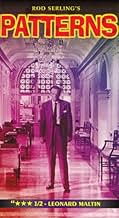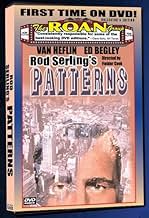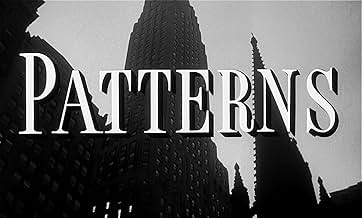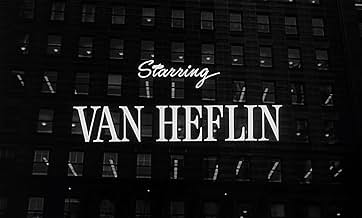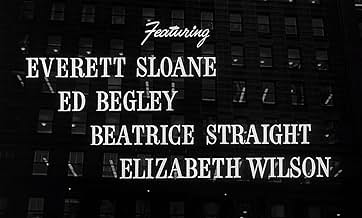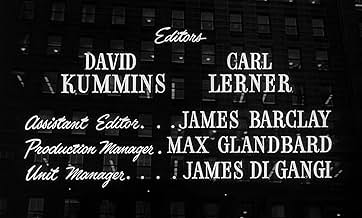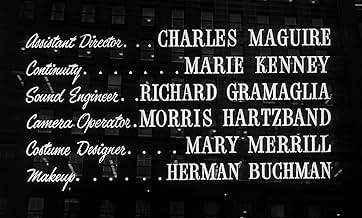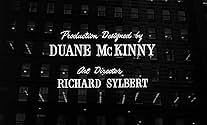अपनी भाषा में प्लॉट जोड़ेंWhen Fred Staples is recruited onto the board of a high-powered New York corporation, he finds his ethics and ambition at odds.When Fred Staples is recruited onto the board of a high-powered New York corporation, he finds his ethics and ambition at odds.When Fred Staples is recruited onto the board of a high-powered New York corporation, he finds his ethics and ambition at odds.
- 1 BAFTA अवार्ड के लिए नामांकित
- कुल 1 नामांकन
- D.J. Vandeventer
- (as Jack Livesy)
फ़ीचर्ड समीक्षाएं
If you're fortunate to find this rarity scheduled, by all means don't miss it.
What Heflin doesn't realize is that he's the object of a corporate power play. Sloane is hard driving, ruthless executive usually in the kind of role Ed Begley plays. For once Ed Begley is a nice guy in a film. He's a decent soul unlike Sloane, but he's past his best years. Sloane doesn't want to fire him, just demean him enough so he'll quit. Begley's loyalties to the company stem from when Sloane's father ran the business and he can't see life beyond it.
All this comes out at the first board meeting that Heflin attends and later at a party that he and wife Beatrice Straight throw for the board members. Heflin is a confused man, caught between liking and admiring Begley and sadly knowing his future lies with Sloane.
A number of films were made in these years about corporate connivings at the top. Patterns can hold its own with any of them and that list would include Executive Suite, The Power And The Prize, Cash McCall, and B.F.'s Daughter in which Van Heflin co-starred with Barbara Stanwyck.
Patterns was originally a television drama and one of the best early scripts done by Rod Serling. Begley and Sloane repeated their roles, movie name Heflin was substituted for Richard Kiley. The filming still betrays its photographed teleplay origins, but the players more than compensate for the deficiencies there.
For a good look at how we saw corporate America in the Eisenhower years you can't do much better than Patterns or any of the other films I mentioned.
Ramsey knows no one likes him, but he couldn't care less. He'd rather play to win than play nice. He knows that it's time for nice old boy Bill Briggs (Ed Begley) to go and he's found just the man to take his place in Staples, who'd been managing his plant in Ohio. The only problem is that Staples genuinely likes Briggs and detests Ramsey.
You'll hate Walter Ramsey too, but you'll see that he built his company not merely through intimidation but by being an excellent judge of character. He recognizes that Staples, who seems clueless when it comes to office politics, is immensely talented and actually very ambitious. Ramsey sees that the fact Staples will never like him is really an asset. He doesn't want a groveling yes-man, he needs someone who will fight him.
Of course Briggs also fights with Ramsey, but his punches never land. His arguments are easily brushed aside and only serve to make Ramsey even angrier. Briggs refuses to accept that he's washed up, which reflects either his stubborn nature or his lack of professional vision. In any case, it's a fatal flaw and Ramsey mercilessly carves him up.
This is painful to watch and all your sympathy is with Briggs, but from a business perspective you have to accept that Ramsey is right. Gradually, Staples sees this as well and that Ramsey understands him better than he understands himself. At the end, Fred Staples hates Walter Ramsey more than ever but he can't resist his boss' challenge. And Ramsey knows that though the price was high, he finally has the man he wants as his vice president.
"Patterns" offers many solid performances, especially Sloane's and Heflin's. Ed Begley is hardly my image of a corporate executive (he was much more credible as the cop turned crook in "Odds Against Tomorrow"), but he certainly looks the part of a sick man. Watching Beatrice Straight I couldn't help but recall her role in "Network" and wonder if her Nancy Staples would suffer the same fate in the 1970s. Straight had a rare combination of intelligence and beauty, and it's a shame she made so few films.
"Patterns" is quick (about 85 minutes) because it has to be. Were it any longer Ramsey's bullying of Briggs would be unbearable and the film's real point would be lost.
Today we flatter ourselves when we think that characters like Ramsey went out with the Edsel. It's a different world, but it's still a cruel one. Working women are no longer called "girls" and some may have moved into executive suites, but the corporation imperatives are the same as they were in 1956: know your people, know your product, make money, cut your losses.
None of this was lost on Walter Ramsey. We may hate him, but as much as we hate to admit it, we still need him. That's not the way we like it but that's the way it is.
Everett Sloane, Ed Begley and Van Heflin really provide the viewers with an acting tour de force. Sloane as the big boss Walter Ramsey, creates a strutting despotic character that is as memorable as it is harsh, here's a man who will not "pattern" a sacking of an employee, he would rather break him into resignation!, a totally vile and cruel "pattern" tactic. Begley (superbly playing weary emotion) plays the genial and honest William Briggs, who upon welcoming Van Heflin's Fred Staples to the company, realises it's likely to be at his own cost. This giving the film a deep emotional "pattern" as Staples (Heflin to me, donning a career high) gets conflicted about his role in this company, this leads us to a truly excellent finale as Heflin and Sloane go at each other with a gripping intensity that many modern actors could do no worse than to take note of, it really is something to behold.
A fabulous movie that comes highly recommended to anyone who appreciates dialogue driven films with intelligence pouring from every frame. 9/10
क्या आपको पता है
- ट्रिवियाBased on a teleplay by Rod Serling, Patterns (1955). It featured several of the same actors who would appear in the movie, including Everett Sloane and Ed Begley. However, the part of Fred Staples, the lead, was originated by Richard Kiley. Begley's character, Bill Briggs, was called Andy Sloane in the original version. Serling's teleplay won him the first of his six Emmy Awards.
- गूफ़The dialog in the final scenes, starting with Staples' conversation with his wife in a coffee shop near his office, indicate the events take place well into the evening. However, the exterior shot linking this scene with Staples' confrontation with Ramsey in the Ramsey & Company building, as well as the exterior shot that follows the confrontation, were both taken in broad daylight.
- भाव
Bill Briggs: On our level you don't get fired, you know that. After thirty years of productive work, they can't say to a man like me, "Alright, now get out!" They just can't do that. So what do they do? They create a situation. A situation you can't work in and finally that you can't live in with this tension, abuse. Small humiliations. It all starts out on a scale so subtle, so microscopic that at first you can't really believe it's happening at all. But gradually the thing begins to take shape. The pieces fit together - all the little bits. And it becomes unmistakable. They chip away at your pride, your security until you begin to have doubts, and then fears.
- कनेक्शनReferenced in American Masters: Rod Serling: Submitted for Your Approval (1995)
टॉप पसंद
- How long is Patterns?Alexa द्वारा संचालित
विवरण
- रिलीज़ की तारीख़
- कंट्री ऑफ़ ओरिजिन
- आधिकारिक साइटें
- भाषा
- इस रूप में भी जाना जाता है
- El precio del triunfo
- फ़िल्माने की जगहें
- Pine Street and Nassau Street, मैनहटन, न्यूयॉर्क शहर, न्यूयॉर्क, संयुक्त राज्य अमेरिका(Nancy drops off Fred on his first day at work)
- उत्पादन कंपनियां
- IMDbPro पर और कंपनी क्रेडिट देखें
- चलने की अवधि1 घंटा 23 मिनट
- रंग
- ध्वनि मिश्रण
इस पेज में योगदान दें



